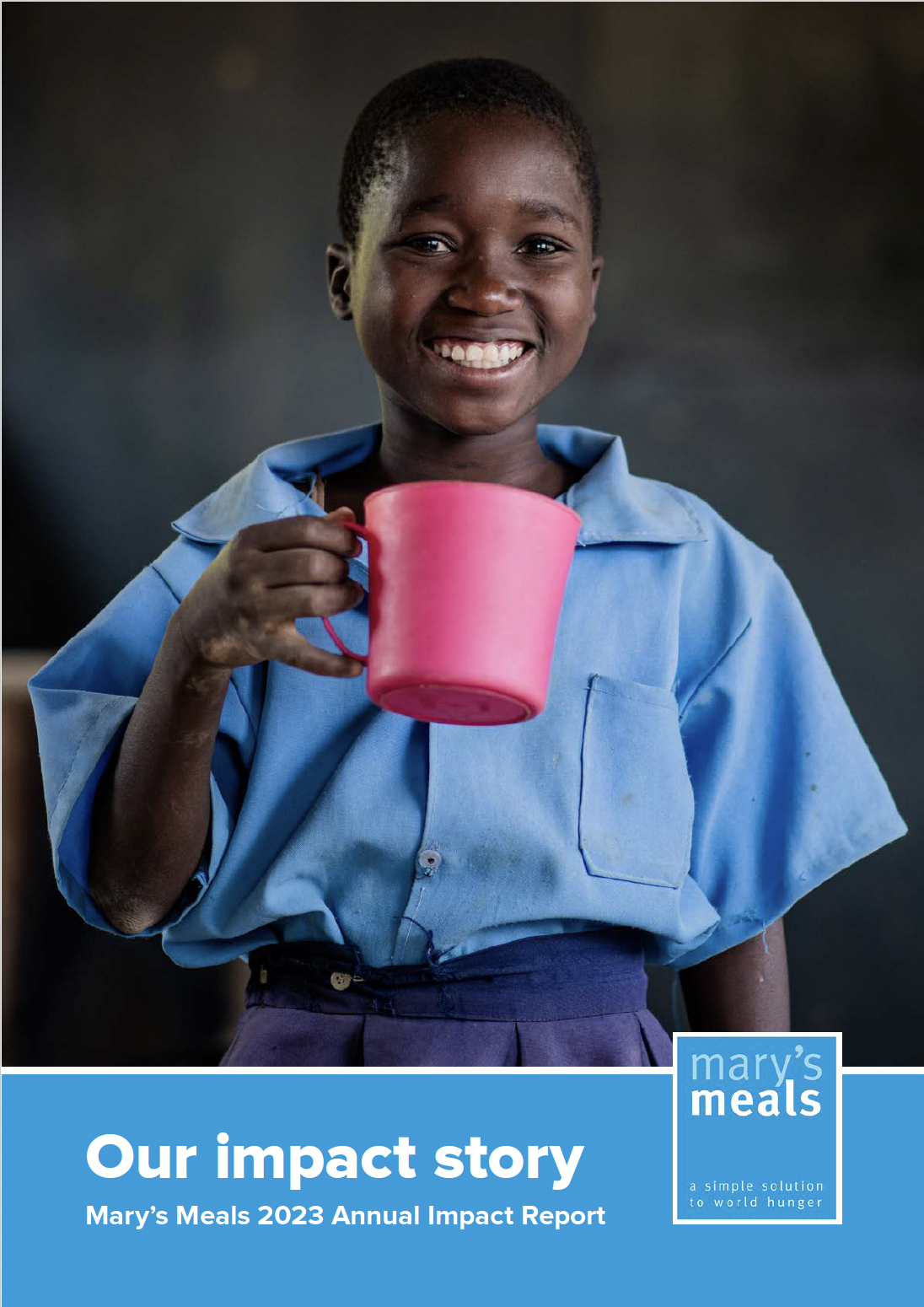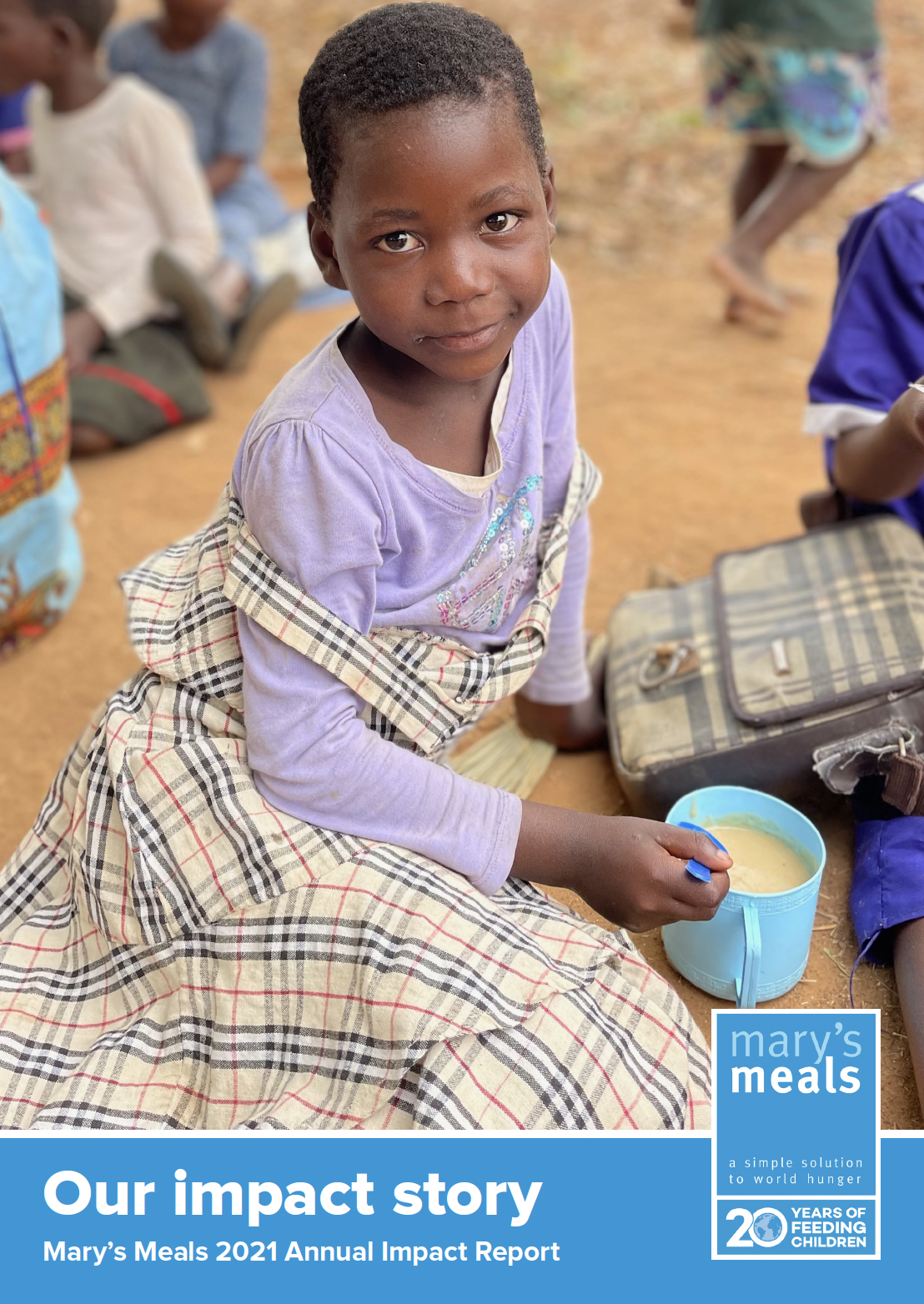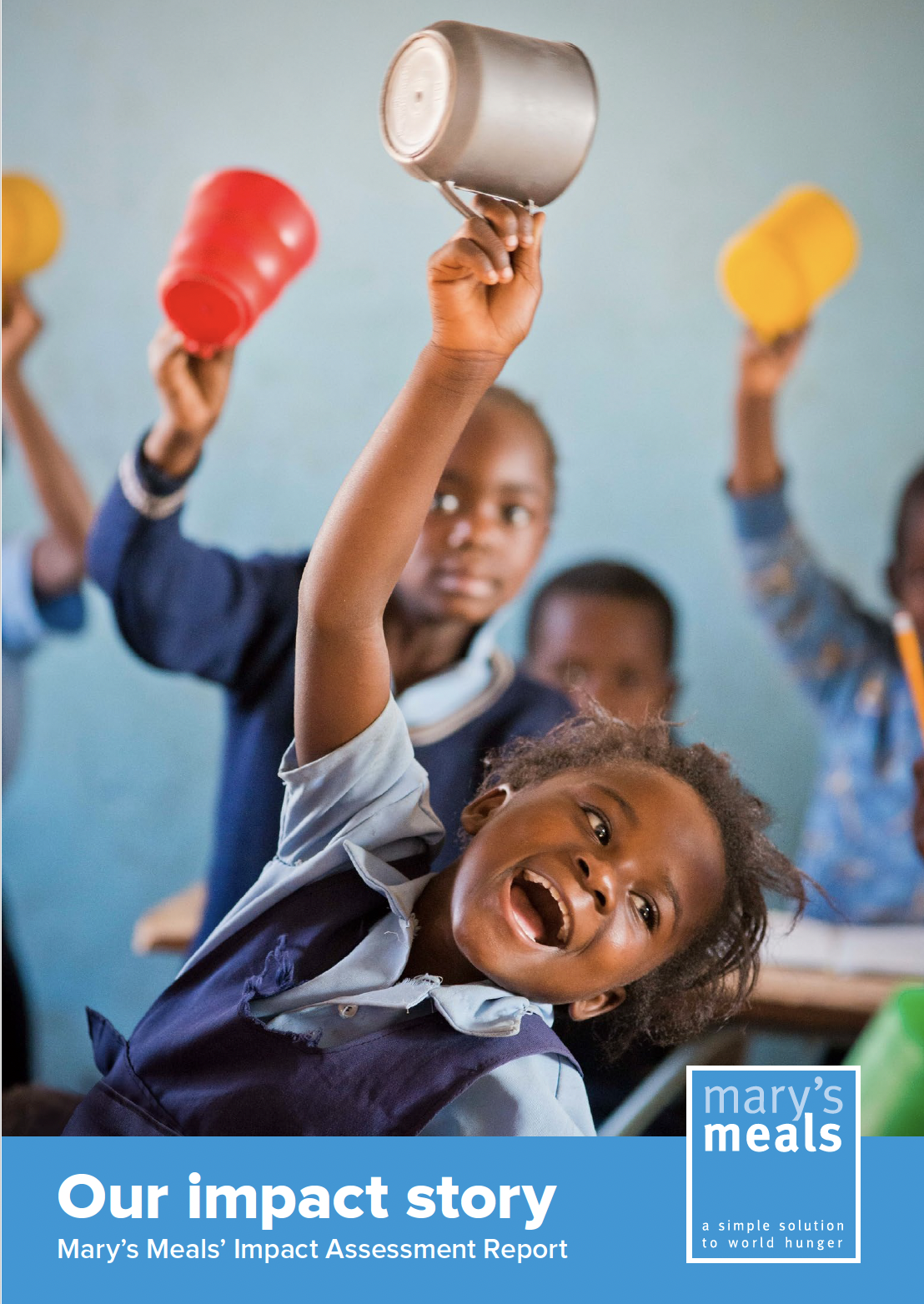Impact Of Our Work
By providing a daily meal in a place of learning, we meet the immediate needs of hungry children and encourage them to go to school to gain an education that can, in the future, be their ladder out of poverty.
On a good day, it takes Sarah three hours to walk to school. She arrives tired and hungry, eagerly awaiting her morning mug of porridge.

She told us: “I’m shy about saying this, but before Mary’s Meals arrived, I used to skip school because of hunger. I was too tired to concentrate in class, so I would go looking for food.
I really enjoy the porridge. It sustains me and helps me work. School makes me happy. I want to be a teacher one day. I dream of building my parents a house.”
What people tell us about Mary’s Meals
Country Reports
Read more about our impact in the countries where we deliver school feeding programs.
We are committed to monitoring and evaluating our work. We use the results from this to improve our school feeding programs and strengthen our organization to ensure that we can deliver on our promises to children and their communities.
Our programs work to contribute to the following positive changes:
- Child hunger at school and pre-school is reduced.
- More children access school and pre-school education.
- Child health and wellbeing at school and pre-school improves.
- More children engage in school and pre-school education.
- Pre-school children are better prepared for primary school.
- Community ownership of and engagement in school feeding increases.
- More children progress within school and pre-school education.
- The value placed on education by communities increases.
- Others are influenced and encouraged to contribute to, support, take ownership of, and replicate effective school feeding programs.
We have a monitoring, evaluation and learning strategy, which reflects our commitment to assessing our impact through a combination of long-term research and ongoing monitoring. We use this data to build and share learning about what works and how we can improve.
You can find out more about the Mary’s Meals Theory of Change and how we measure the impact of our work on children and communities by reading our Monitoring, Evaluation and Learning Strategy 2018-2020.
Making a difference for children
Mary’s Meals is currently conducting five-year quasi-experimental impact assessment research projects in Malawi, Zambia and Liberia to examine and evidence the impact that Mary’s Meals’ school feeding program is having on the lives of vulnerable children and their communities.
This work is designed, project-managed and delivered by Mary’s Meals and is being independently assessed, evaluated and verified throughout by the International NGO Training and Research Centre (INTRAC). INTRAC’s scrutiny is essential in ensuring that our work is objective and credible.
The studies assess the impact of Mary’s Meals’ programs against groups of schools where we are not currently feeding but plan to be able to work in future, through surveys and focus groups with children, teachers, volunteers and families.
The results from our research among a sample of schools in Malawi demonstrate that Mary’s Meals’ school feeding program is making a significant impact to reduce levels of child hunger at school and to increase access, participation and progression within primary education. Some of the key findings are:
• Reduced hunger among children at school. Many children, teachers and volunteers observed the positive physical effects that the school feeding program is making. For example, the percentage of children saying they feel hungry at school at least ‘sometimes’ decreased from 87% to 13%. The percentage of teachers saying ‘children in my class never complain of hunger’ increased from 7% to 87%.
• Improved school attendance and the elimination of absences attributed to hunger. Our research found a marked reduction in the numbers of children leaving school early during the school day. Most importantly, the incidences of this linked to hunger disappeared completely (decreasing from 29% to 0). 98% of teachers said that children pay more attention in class since Mary’s Meals started feeding at their school.
• Reduced levels of children dropping out of school. Teachers reported a reduction in the number of children dropping out of school due to hunger and observed that progression and completion rates had improved. 99% of children said they find it easier to learn at school.
• Increased feelings of happiness at school and decreased levels of anxiety due to hunger. The percentage of children saying ‘I feel happy at school’ increased from 60% to 81%, and 97% of children said having Mary’s Meals’ porridge at school had made a positive difference to their lives. The percentage of children saying they worry about being hungry at school at least ‘sometimes’ decreased from 61% to 7%.
Ultimately the report demonstrates that as well as attracting children in to the classroom and improving enrolment and attendance, school feeding has the power to reduce classroom hunger, improve concentration and participation in class, as well as affecting children’s overall happiness and hunger-related anxiety, acting as a key investment in a country’s future and a cost-effective route out of poverty for the long-term.
Findings at a glance
Improved attendance. Decreased absence due to hunger. Decreased incidence of children leaving school early during the school day (incidences of this linked to hunger disappeared completely). Increased concentration at school, improved attention levels in class, greater participation in lessons, improved ability to learn and increased attainment – as reported by children and teachers
Mary's Meals Aim | Impact |
| Reduced hunger for children living in poverty who attend school | Reduction in hunger at school and resulting physical effects reported by children, teachers and volunteers. |
| Increased access to primary education for children living in poverty | Increased enrolment. Decreased numbers of children out of school in local community. Initial increase in class sizes. |
| Improved engagement in primary education of children living in poverty | Improved attendance. Decreased absence due to hunger. Decreased incidence of children leaving school early during the school day (incidences of this linked to hunger disappeared completely). Increased concentration at school, improved attention levels in class, greater participation in lessons, improved ability to learn and increased attainment – as reported by children and teachers |
| Increased progression within primary education by children living in poverty | Decreased drop-out and drop-out due to hunger. Increased progression and completion reported by teachers. |
| Improved health and well-being of children living in poverty | Increased feelings of happiness at school and decreased levels of anxiety due to hunger. Reduced incidences of children missing school to work. |
| Increased support for education within vulnerable communities | Increased level of parental involvement in school activities, leading to increased community support for education |
A teacher’s view
In Malawi, we are reaching 30% of the country’s entire primary school population. Irene Kaferapanjira has been teaching at Blantyre Girls Primary School in Malawi since we began feeding there in 2008.
She remembers what it was like to teach before children received Mary’s Meals:
“Learners weren’t coming in to school and when they did come to school they weren’t concentrating in class. They were always so hungry and that made teaching them difficult.
“Now it is the opposite. Because of this programme, more learners are coming to school, staying in school and improving their grades. If Mary’s Meals were to stop feeding, there would be lots of absenteeism.”
We remain committed to delivering our school feeding programs to some of the world’s hungriest children who are in most need, using our unique approach which is simple, but never simplistic.
There are many different ways you can help by donating your time, money, thoughts and prayers.
.jpg)


